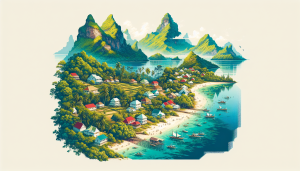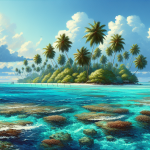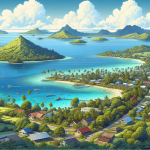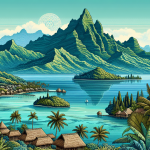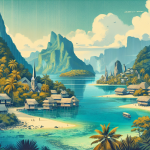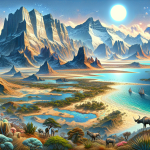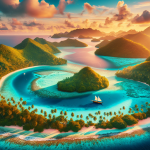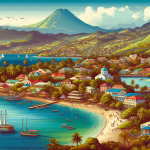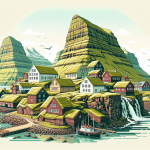Exploring the Hidden Gem of the Indian Ocean: Comoros
Located off the eastern coast of Africa, nestled between Madagascar and Mozambique, lies an often-overlooked archipelago known as Comoros. This small island nation, comprising four main islands—Grande Comore, Mohéli, Anjouan, and Mayotte—offers an enchanting blend of natural beauty, rich history, and vibrant culture. Despite its obscurity on the global tourism map, Comoros is a treasure trove waiting to be discovered. From its unspoiled beaches and verdant landscapes to its unique cultural tapestry, the islands of Comoros offer a plethora of experiences for the intrepid traveler. In this article, we will delve deep into the various facets of Comoros, exploring its geography, history, culture, and the myriad activities that make it a hidden gem in the Indian Ocean. Whether you’re an adventurer seeking new horizons or a history buff eager to uncover ancient stories, Comoros promises an unforgettable journey.
The Geography of Comoros
Grande Comore: The Largest Island
Grande Comore, also known as Ngazidja, is the largest and most developed of the Comorian islands. Dominated by the active volcano Mount Karthala, which last erupted in 2006, the island offers a dramatic landscape of lush forests, black sand beaches, and lava-strewn fields. Moroni, the capital city, is situated on Grande Comore and serves as the political and economic hub of the nation. The city is a blend of modernity and tradition, featuring bustling markets, historical landmarks, and a vibrant nightlife.
Mohéli: The Nature Lover’s Paradise
Mohéli, or Mwali, is the smallest of the four islands but arguably the most enchanting. Known for its pristine beaches, abundant marine life, and lush forests, Mohéli is a haven for nature enthusiasts. The Mohéli Marine Park is a must-visit, offering opportunities for snorkeling, diving, and whale watching. The island is also home to the critically endangered Livingstone’s fruit bat, making it a significant destination for wildlife conservation.
Anjouan: The Island of Perfumes
Anjouan, or Nzwani, is often referred to as the “Island of Perfumes” due to its extensive cultivation of ylang-ylang, cloves, and vanilla. The island’s rugged terrain, characterized by steep mountains and deep valleys, offers breathtaking views and numerous hiking opportunities. The town of Mutsamudu, with its narrow alleys and ancient citadel, provides a glimpse into the island’s storied past.
Mayotte: The French Connection
Mayotte, the fourth island, is an overseas department of France and thus has a different political status compared to the other Comorian islands. Known for its stunning lagoon, one of the largest in the world, Mayotte is a paradise for water sports enthusiasts. The island’s blend of African, Arab, and French influences is evident in its cuisine, architecture, and culture.
The Rich History of Comoros
Ancient Settlements and Trade Routes
Comoros has a rich history that dates back to the early centuries AD. The islands were an important stopover for Arab traders navigating the Indian Ocean, and evidence of ancient settlements can still be found. These early interactions have left a lasting impact on the culture and language of Comoros, which is a blend of African, Arab, and Malagasy influences.
Colonial Era and Independence
In the 19th century, Comoros became a French colony, and its history during this period is marked by economic exploitation and social upheaval. The islands gained independence in 1975, but the journey has been fraught with political instability and economic challenges. Despite these issues, Comoros has managed to preserve its unique cultural identity and traditions.
Modern-Day Comoros
Today, Comoros is a nation striving for stability and development. The islands face numerous challenges, including poverty, political instability, and environmental issues. However, the resilience and spirit of the Comorian people are evident in their efforts to build a brighter future. Tourism is seen as a potential catalyst for economic growth, and the government is taking steps to promote the islands as a sustainable tourism destination.
Cultural Tapestry of Comoros
Language and Religion
The official languages of Comoros are Comorian (Shikomori), French, and Arabic. The majority of the population practices Islam, which plays a significant role in the daily life and culture of the islands. Traditional music, dance, and ceremonies are integral aspects of Comorian culture, reflecting the diverse influences that have shaped the nation.
Festivals and Celebrations
Comoros is home to several vibrant festivals and celebrations that offer a window into its rich cultural heritage. The Mouloud festival, celebrating the birth of the Prophet Muhammad, is one of the most important events and is marked by communal prayers, feasting, and traditional music. The Eid al-Fitr and Eid al-Adha are also widely celebrated, featuring elaborate feasts and family gatherings.
Cuisine
The cuisine of Comoros is a delightful blend of African, Arab, and French influences. Seafood plays a central role, with dishes like langouste à la vanille (lobster with vanilla) and poulet au coco (chicken in coconut sauce) being local favorites. The use of aromatic spices such as cloves, vanilla, and cardamom adds a unique flavor to Comorian dishes, making the culinary experience truly unforgettable.
Activities and Attractions in Comoros
Exploring the Beaches
Comoros boasts some of the most beautiful and unspoiled beaches in the Indian Ocean. The beaches of Chomoni and Itsandra on Grande Comore are perfect for swimming and sunbathing, while the secluded coves of Mohéli offer a tranquil escape. N’Gouja Beach on Mayotte is famous for its crystal-clear waters and vibrant marine life, making it a popular spot for snorkeling and diving.
Hiking and Nature Walks
The diverse landscapes of Comoros provide excellent opportunities for hiking and nature walks. The ascent of Mount Karthala is a challenging but rewarding trek, offering panoramic views of the island and the Indian Ocean. The lush forests of Mohéli and Anjouan are home to numerous hiking trails, where you can encounter rare wildlife and enjoy the serene beauty of nature.
Water Sports and Marine Activities
The clear, warm waters surrounding the Comorian islands are ideal for water sports and marine activities. Snorkeling and diving are particularly popular, with the coral reefs teeming with colorful fish and other marine creatures. The Mohéli Marine Park is a renowned diving destination, offering encounters with dolphins, sea turtles, and humpback whales. Kayaking, sailing, and fishing are also popular activities that allow visitors to explore the stunning coastline and pristine waters.
Historical and Cultural Tours
For those interested in history and culture, Comoros offers a wealth of experiences. The old town of Moroni is a labyrinth of narrow streets, ancient mosques, and bustling markets. The Vendredi Mosque, with its iconic white minaret, is a must-visit landmark. In Anjouan, the town of Mutsamudu features a historic citadel and traditional Swahili architecture, providing a glimpse into the island’s past.
Sustainable Tourism in Comoros
Community-Based Tourism
As Comoros seeks to develop its tourism sector, there is a strong focus on sustainability and community involvement. Community-based tourism initiatives aim to provide visitors with authentic experiences while supporting local communities. Homestays, village tours, and cultural workshops offer a unique opportunity to connect with the people of Comoros and learn about their way of life.
Conservation Efforts
Conservation is a key priority in Comoros, given its rich biodiversity and fragile ecosystems. Efforts to protect endangered species, such as the Livingstone’s fruit bat and the green sea turtle, are ongoing. The establishment of marine parks and protected areas is crucial for preserving the natural beauty and ecological balance of the islands. Visitors are encouraged to engage in responsible tourism practices, such as minimizing waste, respecting wildlife, and supporting local conservation initiatives.
Challenges and Opportunities
While Comoros has immense potential as a sustainable tourism destination, it faces several challenges. Infrastructure development, political stability, and environmental preservation are critical areas that need attention. However, with strategic planning and international support, Comoros can leverage its natural and cultural assets to build a thriving tourism industry that benefits both the environment and local communities.
Practical Information for Travelers
Getting There
Reaching Comoros can be a bit of an adventure in itself, as there are no direct flights from Europe or North America. Most travelers transit through regional hubs such as Nairobi, Dar es Salaam, or Johannesburg. Prince Said Ibrahim International Airport in Moroni is the main entry point, with domestic flights connecting the other islands.
Accommodation
Accommodation options in Comoros range from budget guesthouses to mid-range hotels and luxury resorts. While the tourism infrastructure is still developing, there are several comfortable and charming places to stay. Eco-lodges and community-based accommodations offer a more immersive and sustainable experience.
Travel Tips
- Currency: The local currency is the Comorian franc (KMF). Euros and US dollars are also widely accepted.
- Language: While French and Comorian are the official languages, English is not widely spoken. Learning a few basic phrases in French or Comorian can be helpful.
- Health: Travelers are advised to take precautions against mosquito-borne diseases such as malaria and dengue fever. It’s also important to drink bottled or filtered water to avoid waterborne illnesses.
- Safety: Comoros is generally safe for tourists, but it’s always wise to stay informed about local conditions and follow standard travel safety practices.
Conclusion
Comoros, with its breathtaking landscapes, rich history, and vibrant culture, is a destination that promises an unforgettable experience. While it may not yet be a mainstream tourist hotspot, its unspoiled beauty and unique charm make it a hidden gem worth exploring. As the nation continues to develop its tourism sector with a focus on sustainability and community involvement, there is no better time to discover the wonders of Comoros. Whether you’re hiking the slopes of Mount Karthala, diving in the crystal-clear waters of Mohéli, or immersing yourself in the rich cultural heritage of Anjouan, Comoros offers a journey of discovery that will leave a lasting impression. So pack your bags and set off on an adventure to this enchanting archipelago—you won’t be disappointed.
For more information about travel tips and destinations, you can visit Lonely Planet.
